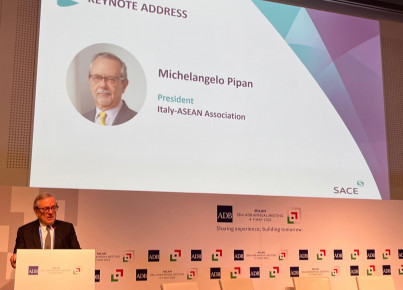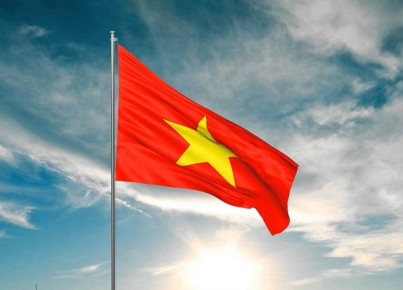By Pierfrancesco Mattiolo
The EU aims at a 'values-based' trade policy and promotes environmental protection and social rights with its free trade agreements. This approach has influenced negotiations with ASEAN countries.
International trade and sustainable development are inherently linked. Increased traffic of goods brings greater economic opportunities for both the EU and ASEAN countries. Yet it could also encourage the exploitation of natural and human resources in violation of international standards. Brussels accepted the challenge and upped the ante: recent free trade agreements (FTAs) include TSD (Trade and Sustainable Development) chapters to increase commitment and cooperation in achieving the United Nations Sustainable Development Goals (SDGs). Alessia Mosca - Vice-President and Secretary-General of the Italy-ASEAN Association, - spoke on 4th June at a conference organised by the Collegio "Bernardo Clesio" of the University of Trento on this issue, describing how the European trade doctrine has evolved in recent years and how relations with ASEAN countries have developed. The topic is also relevant to other regions: Mosca discussed with Paolo Garzotti - Head of the Latin America Unit at the European Commission's DG Trade and former Deputy Head of the EU mission to the World Trade Organisation (WTO) - who is currently involved in negotiations with the Mercosur countries.
The European Commission had already made clear its intention to pursue 'a Trade and Investment Policy Based on Values' in the strategy document Trade for all, including as objectives of its trade agenda the promotion of sustainable development, human rights and good governance. The document is dated October 2015, within a few weeks the EU-South Korea Free Trade Agreement (already in force provisionally since 2011) would be formally ratified, the first of the so-called ‘second generation agreements’. This new generation of FTAs differs from the previous one since it includes chapters on subjects never covered before: trade in services, protection of intellectual property and, indeed, the promotion of sustainable development through trade (TSD).
The concept of "sustainable development" embraced by the EU is the one defined by the UN in the 2030 Agenda for Sustainable Development, also signed in 2015, and combines the protection of the environment with social and economic growth. Looking at the TSD Chapters of the second-generation agreements, for instance, we find provisions that require partners to comply with international climate agreements or to ratify and implement International Labour Organisation (ILO) conventions. Last February, the Commission reaffirmed in its Trade Policy Review that it would not only continue to pursue the UN's Sustainable Development Goals through trade policy but it would also be more assertive in enforcing FTAs and TSD chapters.
As far as relations with ASEAN countries are concerned, the EU has signed two FTAs with Singapore (EUSFTA, 2018) and Vietnam (2019) to date, while the one with Indonesia is at an advanced stage of negotiation. Consistent with the line expressed by the Commission, all these agreements include a TSD chapter. For the EUSFTA, negotiations on the chapter were particularly straightforward, as Singapore was already aligning with core ILO standards, and also produced rules on fisheries and logging. The Agreement with Vietnam also provides a noticeable level of commitment to labour rights (which Hanoi has followed up by by ratifying important ILO conventions) and environmental protection. Singapore and Vietnam are respectively the EU's first and second trading partners among ASEAN countries in terms of trade in goods and services, and the two FTAs will set a key precedent for future negotiations with other countries in the region. However, it is not enough to put commitments in writing: particular attention will have to be paid to the effective implementation of the TSD Chapter and, if necessary, to the enforcement of the Agreements. The involvement of civil society in the partner countries will be essential to measure the progress made in practice and, precisely for this reason, the FTAs provide for ad hoc stakeholder consultation tools.
While negotiations on the trade agreement with Indonesia are at an advanced stage, the other tables opened by Brussels with the ASEAN countries are at a standstill (Malaysia, Thailand, the Philippines). It is precisely on the TSD chapters that differences in views between the EU and its partners on specific issues become visible. For example, the issue of vegetable oils is not easy to handle for the Commission, as it seeks to strike a balance between the demands of European public opinion and the sensitivities of Jakarta and Kuala Lumpur - sensitivities that sometimes even lead to legal action at the WTO. However, it is important to recall that FTAs are not the only instrument with a TSD approach used in the region: Generalised Schemes of Preferences (GSP) have proven to be an effective means to grant privileged market access to the EU market to countries such as Cambodia, Myanmar (both beneficiaries of the most favourable regime, EBA - Everything But Arms, which grants duty and quota-free exports to Europe) and the Philippines. In order to continue to benefit from the GSP, however, the partners must commit to adopting and implementing sustainable development policies. Otherwise, the scheme will be revoked, a measure adopted against Cambodia after a long process of scrutiny and confrontation and that could also be taken against Myanmar. The dilemma facing the EU is not an easy one to solve. On the one hand, it is necessary to be rigorous in imposing on ASEAN countries the respect of environmental and social obligations, in line with the European ambition to have a "value-based" trade policy, in which the commitments on SDGs taken at bilateral and multilateral level with the partner are binding. On the other hand, it is also necessary to bear in mind these countries' needs and the risk that, in the absence of an agreement with the EU, they may end up in the commercial sphere of other powers. Deepening the relationship between Europe and each ASEAN country is a necessary precondition for greater cooperation on the challenges of the 2030 Agenda.






